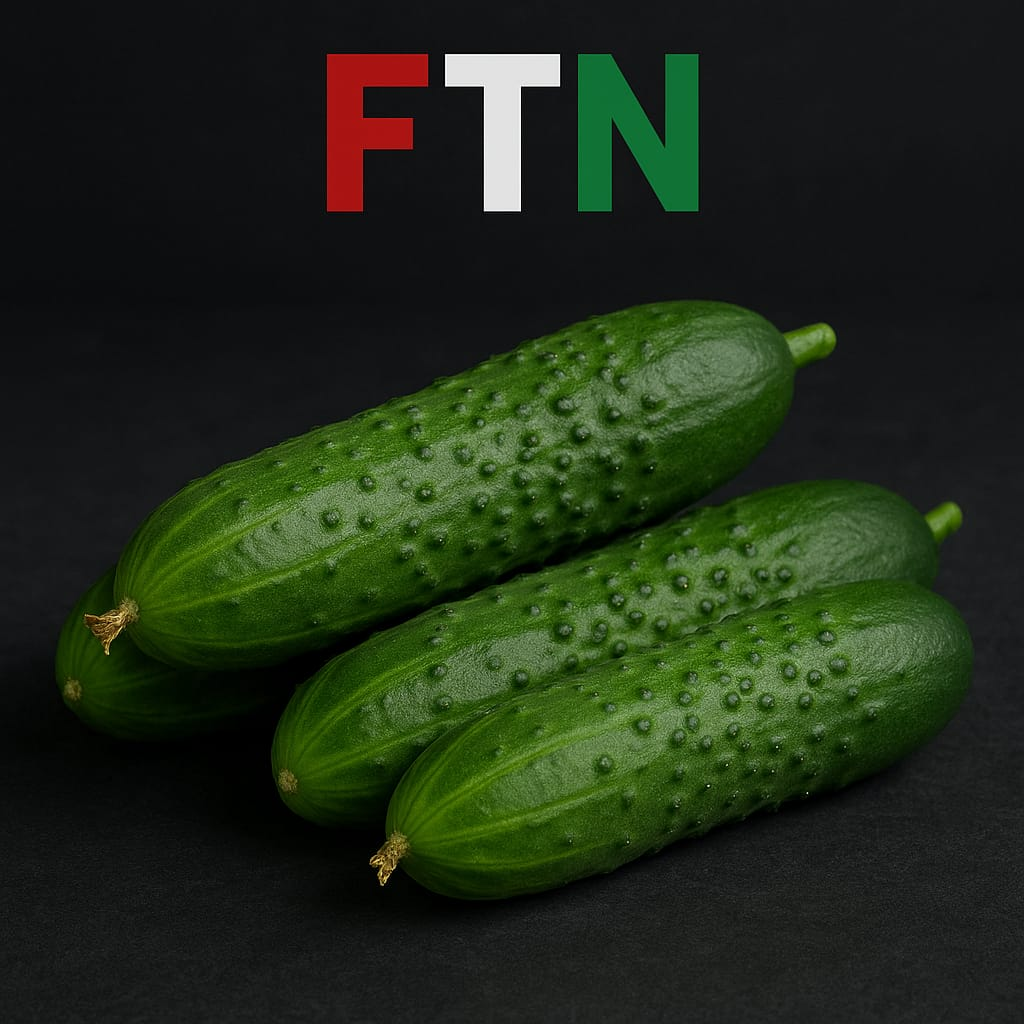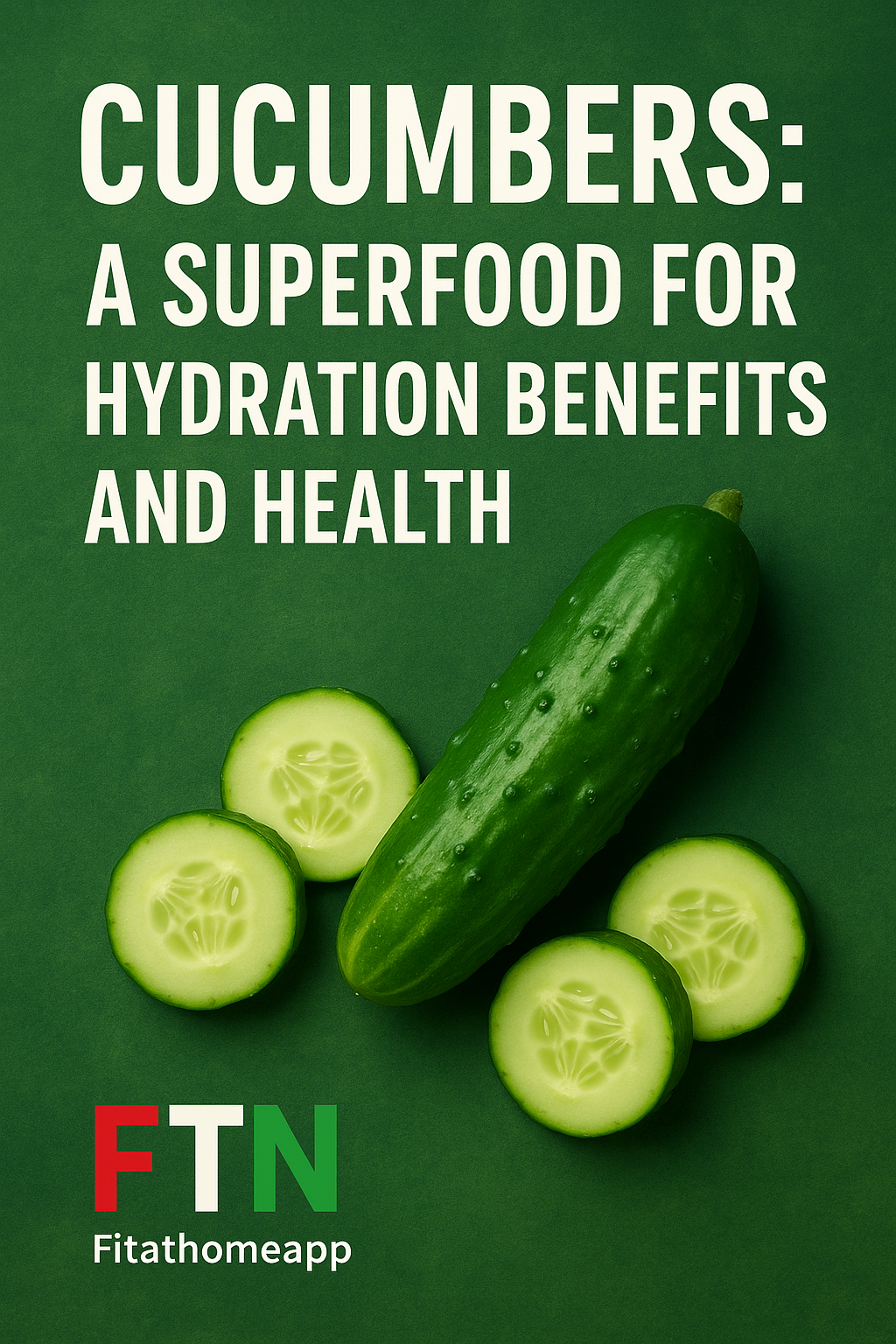The Critical Role of Hydration Benefits in Daily Health and Wellness
Staying hydrated is one of the simplest yet most essential aspects of maintaining good health. Water plays a vital role in nearly every function of the human body—from regulating internal temperature and supporting nutrient absorption to removing waste and keeping skin glowing. With the human body composed of about 60% water, it’s no surprise that dehydration can have a serious impact on both mental and physical performance.
Even a small drop in hydration—just 1–2% of body weight—can lead to noticeable effects like fatigue, difficulty focusing, and memory lapses. Studies show that adequate hydration can boost energy, improve mood, and increase concentration, helping people stay sharp throughout the day.
While recommendations vary, the National Academies of Sciences suggest a daily intake of around 3.7 liters for men and 2.7 liters for women, including both fluids and water-rich foods. That’s where cucumbers come in—an affordable, hydrating superfood that’s rapidly gaining popularity in households across the U.S.
🥒 Cucumbers: A Superfood for Hydration benefits and Health
Cucumbers are about 95% water, making them one of the best natural foods for staying hydrated. But they offer far more than just hydration—they’re low in calories, high in vitamins and minerals, and incredibly versatile.
Here are just a few nutritional highlights of cucumbers:
✅ Vitamin K: Essential for bone health and blood clotting
✅ Potassium & Magnesium: Important for heart function and hydration balance
✅ Vitamin A: Supports immune function and vision
✅ Fiber: Especially when eaten with the skin, helps digestion and satiety
With only about 16 calories per cup, cucumbers are a guilt-free snack that supports weight management and digestive health.
Their affordability and year-round availability make them a smart option for families looking to eat healthy without overspending. Whether you buy them fresh from a local farmer’s market or grow them at home, cucumbers are a budget-friendly investment in better health.
💲 Budget-Friendly Benefits of Choosing Cucumbers
In a time when groceries are getting more expensive, cucumbers stand out as an economical solution for people aiming to eat healthily without breaking the bank. Compared to other fresh produce or hydration alternatives like bottled juices or specialty drinks, cucumbers offer:
🏷️ Low per-unit cost
🧃 High water content
🍃 Nutritional value without added sugar or preservatives
They’re widely available in supermarkets, local markets, and home gardens, making them easy to source and store. Cucumbers also have a solid shelf life—lasting up to a week in the fridge—which makes them perfect for weekly meal prep.
🍽️ Creative and Delicious Ways to Add Cucumbers to Meals
Don’t let their mild flavor fool you—cucumbers can be used in countless ways that are both flavorful and fun. Here are some easy ideas to help you incorporate them into your daily meals:
🥗 1. Cucumber Salad
Slice cucumbers and mix them with tomatoes, onions, olive oil, and vinegar for a quick, refreshing side.
🥒 2. Dipping Slices
Use cucumber rounds as a low-calorie base for dips like hummus, guacamole, or tzatziki. They’re crunchy, refreshing, and kid-friendly!
🧀 3. Cucumber Roll-Ups
Roll thin slices of cucumber around fillings like cream cheese, smoked salmon, or mashed avocado for a light and elegant snack.
💧 4. Cucumber-Infused Water
Add sliced cucumber to a pitcher of water for a cooling, lightly flavored drink. For extra zing, toss in lemon, lime, or mint.
🍝 5. Spiralized Cucumber Noodles
Use cucumbers as a low-carb alternative to pasta—just spiralize, add your favorite dressing or sauce, and top with protein for a full meal.
These easy recipes show just how versatile cucumbers can be—turning simple ingredients into hydrating, healthy meals.
🧊 Meal Prep Magic: Why Cucumbers Are Perfect for Planning Ahead
Cucumbers are ideal for those who meal prep regularly. Here’s why:
🧊 They stay fresh for several days in the fridge when stored in airtight containers.
🥗 Pre-slicing or dicing cucumbers makes healthy snacking more accessible throughout the week.
🧃 They can be added to smoothies, grain bowls, wraps, or sandwiches—no cooking required.
You can even prepare DIY meal kits by combining cucumbers with proteins, grains, and dressings. This method saves time, keeps meals interesting, and ensures you’re staying hydrated without much effort.
💡 Staying Hydrated on a Budget: A Win-Win Strategy
Hydration isn’t just a wellness buzzword—it’s a long-term investment in your health. Dehydration has been linked to serious health issues like:
💢 Kidney stones
🔥 Urinary tract infections
⚠️ Cognitive decline and fatigue
Choosing affordable hydrating options like cucumbers helps prevent these conditions, potentially reducing healthcare costs over time.
Plus, staying hydrated has been associated with:
📈 Better productivity at work
😌 Improved focus and emotional regulation
🛌 Better sleep and recovery
In short, eating cucumbers regularly helps your body and your wallet.
🌎 The Eco-Friendly Choice: Cucumbers and Sustainability
Choosing cucumbers over processed drinks also benefits the environment. Unlike bottled water or sports drinks—which require plastic packaging, shipping, and refrigeration—cucumbers are natural, local, and low-impact.
Here’s how cucumbers support sustainable living:
🌿 Less packaging waste
🚛 Lower transportation emissions
🧑🌾 Support for local farmers and markets
🏡 Potential for home gardening
Growing your own cucumbers is easy and rewarding. All it takes is a bit of space, sunlight, and water to start producing your own fresh, organic vegetables—no plastic needed.
🧂 Addressing the Challenges: Making Cucumbers Taste Great
Some people may shy away from cucumbers due to their mild taste. But there are plenty of ways to boost flavor and keep them exciting:
🧄 Add seasonings like garlic, dill, or chili flakes
🍋 Use dressings, marinades, or vinegars for bold flavor
🥒 Try pickling them for a tangy, crunchy snack year-round
In colder months, when fresh cucumbers are less available, consider:
🫙 Pickled or canned cucumbers
🛒 Buying in bulk during summer and storing properly
🏡 Freezing blended cucumber as a smoothie base
With a little creativity, cucumbers can be a staple all year long.
✅ Final Thoughts: Embrace Cucumbers for Healthier, Smarter Hydration
Incorporating cucumbers into your diet is a simple, low-cost step toward better health. They hydrate, nourish, and add crunch to your meals—all without hurting your budget. Whether you’re a busy parent, a college student, or someone looking to eat cleaner, cucumbers offer:
🥤 High hydration
🍽️ Nutritional value
💸 Affordability
🌎 Sustainability
So next time you’re at the grocery store or planning your meals, toss a few cucumbers in your cart. Your body—and your wallet—will thank you. 🥒💧
Personal Insight & Suggestions for Enhancement
Personal Take:
I found the video engaging; the visuals do a great job of illustrating how cucumbers can elevate both wellness and appearance. By focusing on skin and inflammation benefits, it enriches the health narrative in my article beyond mere hydration.
Suggestions to Add Depth:
Highlight Nutritional Stats: Add pop-up captions such as:
“95% water for optimal hydration”
“Rich in vitamin K for bone and skin health”
Include Practical Serving Ideas: Show quick clips of cucumber water, salads, or roll-ups to bring hydration suggestions to life.
Address Digestive Timing: A brief mention about waiting 20–30 minutes to drink water post-cucumber could help readers avoid bloating or indigestion (referencing recent digestive guidance) .
Add Sustainability Angle: A reminder that cucumbers are affordable, easy to grow, and generate minimal waste would pair well with your article’s eco-friendly tone.
🥒 Cucumber vs. Zucchini: Similar Look, Different Strengths
At first glance, cucumber and zucchini might look like twins in the produce aisle—long, green, and mild in flavor. But when you dig deeper, these two veggies serve different purposes in your diet and offer unique health benefits.
🧊 Cucumber: Nature’s Hydration Hero
Cucumber is composed of about 95% water, making it one of the best vegetables for hydration. It’s naturally cooling, crisp, and refreshing—perfect for hot days, detox diets, or anyone who struggles to drink enough water.
Key Benefits:
- High water content = better hydration
- Supports skin health and digestion
- Virtually calorie-free (only ~16 calories per cup)
- Best enjoyed raw in salads, smoothies, or infused water
Cucumbers are also rich in silica, which supports healthy skin and connective tissue—great for a glow-up from the inside out.
🔥 Zucchini: The Low-Carb Powerhouse
While zucchini looks like a close cousin of cucumber, it’s much more versatile when it comes to cooking. Unlike cucumber, zucchini can be roasted, grilled, sautéed, or even baked into breads and muffins.
Key Benefits:
- Low in carbs and rich in fiber
- High in vitamin C and antioxidants
- A great pasta alternative (think: zoodles!)
- Aids in weight loss and blood sugar control
Zucchini shines in warm meals, making it ideal for people following keto, low-carb, or plant-based diets.
🍽️ So… Which One Should You Choose?
- Choose cucumber when you need hydration, a refreshing snack, or a raw crunch in your meals.
- Choose zucchini when you’re cooking healthy meals and need a low-carb, nutrient-rich base that adapts to almost any flavor



[…] cucumber for hydration, light snacking, and refreshing raw […]